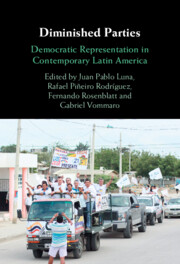Book contents
- Diminished Parties
- Diminished Parties
- Copyright page
- Contents
- Figures
- Tables
- Contributors
- Acknowledgments
- Abbreviations
- 1 Introduction
- 2 The Case of Uruguay’s Frente Amplio
- 3 Horizontal Coordination and Vertical Aggregation Mechanisms of the PRO in Argentina and Its Subnational Variations
- 4 Bolivia’s Movement toward Socialism: A Political Party Based on and Anchored in Social Movements
- 5 The Complex Interaction between Vertical Interest Aggregation and Horizontal Coordination: The PRD and MORENA in Mexico
- 6 PLN and PAC: Two Costa Rican Parties with Constituencies Evolving in Opposite Directions
- 7 The Case of the Traditional Parties in Paraguay
- 8 The Colombian Liberal Party and Conservative Party: From Political Parties to Diminished Subtypes
- 9 “Normal” Parties in Extraordinary Times: The Case of Primero Justicia and Voluntad Popular in Venezuela
- 10 Diminished by Design: Ecuador’s Alianza PAIS
- 11 The Chilean PPD: A Loose Confederation of Leaders
- 12 Fujimorismo and the Limits of Democratic Representation in Peru, 2006–2020
- 13 The Unidad Nacional de la Esperanza: Guatemala’s Only True Political Party?
- 14 Conclusions
- References
- Name Index
- Organization Index
- Subject Index
2 - The Case of Uruguay’s Frente Amplio
Published online by Cambridge University Press: 09 December 2021
- Diminished Parties
- Diminished Parties
- Copyright page
- Contents
- Figures
- Tables
- Contributors
- Acknowledgments
- Abbreviations
- 1 Introduction
- 2 The Case of Uruguay’s Frente Amplio
- 3 Horizontal Coordination and Vertical Aggregation Mechanisms of the PRO in Argentina and Its Subnational Variations
- 4 Bolivia’s Movement toward Socialism: A Political Party Based on and Anchored in Social Movements
- 5 The Complex Interaction between Vertical Interest Aggregation and Horizontal Coordination: The PRD and MORENA in Mexico
- 6 PLN and PAC: Two Costa Rican Parties with Constituencies Evolving in Opposite Directions
- 7 The Case of the Traditional Parties in Paraguay
- 8 The Colombian Liberal Party and Conservative Party: From Political Parties to Diminished Subtypes
- 9 “Normal” Parties in Extraordinary Times: The Case of Primero Justicia and Voluntad Popular in Venezuela
- 10 Diminished by Design: Ecuador’s Alianza PAIS
- 11 The Chilean PPD: A Loose Confederation of Leaders
- 12 Fujimorismo and the Limits of Democratic Representation in Peru, 2006–2020
- 13 The Unidad Nacional de la Esperanza: Guatemala’s Only True Political Party?
- 14 Conclusions
- References
- Name Index
- Organization Index
- Subject Index
Summary
This chapter analyzes the case of the Frente Amplio (Broad Front, FA) in Uruguay as an unusual organization. Since its founding, the FA has exhibited a dual structure: a coalition of various factions that compose the party and a movement comprising a common grassroots structure (Base Committees). The latter is not necessarily affiliated with any particular faction and it participates in all of the party’s decision-making structures. The FA fulfills the essential functions required to qualify as a political party. These functions manifest themselves in the participatory processes that develop the party’s electoral platforms and also control the nomination of presidential candidates. More critically, the coalition and the grassroots movement tended to influence the policy decisions of the party’s parliamentary caucus when the FA was an opposition party, as well as the decisions of the executive branch when the FA was in government (2005–20). In this process, grassroots party activists exercised significant influence over political decisions that were particularly sensitive for the Left. Regarding vertical interest aggregation, the FA has developed strong, informal links with various social actors, especially with labor unions.
- Type
- Chapter
- Information
- Diminished PartiesDemocratic Representation in Contemporary Latin America, pp. 29 - 47Publisher: Cambridge University PressPrint publication year: 2021
- 1
- Cited by



